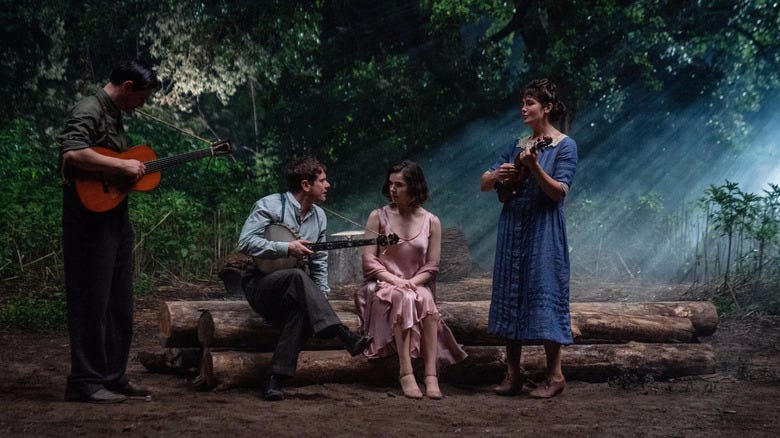Issue #98: 'Sinners' and Country's Original Sin
Sorry, plenty of spoilers ahead - but go see it!
By Natalie
“White folks, they like the blues just fine,” says Delroy Lindo, speaking as bluesman Delta Slim near the beginning of Ryan Coogler's much-lauded new epic Sinners. “They just don’t like the people who make it.”
This core dissonance is, of course, also the core dissonance at the heart of American popular music and culture — the "love and theft" that Eric Lott traces back to long before the blues had a name or an inscribed form, much less recordings and written history. Sinners is a visceral, breathless depiction of the violence in that tension, the reckless destruction it breeds and the soullessness it engenders in everyone it touches.
The beloved myth of Robert Johnson selling his soul to the devil at a crossroads in Mississippi in exchange for blues guitar bona fides is turned on its head; instead the musicians and revelers are trying to evade supernatural evil to keep playing music, the supernatural evils being, naturally, white people who promise a postracial utopia. They are literal vampires, aiming to suck the lifeblood out of Black artists' freedom and creativity.
What does it have to do with country music? Well, country music comes from the blues, and from Black musicians, first and foremost — a fact that I do think the movie might have hammered home a tad harder for the uninitiated, despite the fact that it appears pillars of the Black roots space like Rhiannon Giddens and Jake Blount are billed as music consultants on the soundtrack.
The film makes hay, instead, out of the gap between the juke joint blues of its Black characters and the Irish-via-Appalachian string music of the vampires (who say, I believe, that they come from North Carolina by way of explanation for the aesthetic…); it's played for humor that the white vampires perform a song historically performed by Black artists in a straightlaced, "white" folk style (with, notably, the original slurs omitted). When the movie cuts back to the scene inside the juke joint, it seems that there is some string band music being played by Black musicians — it's very much in the background, though.
The point that I think was missing, at least in my reading of the movie, was that the aesthetic gap between "white" and "Black" music at that point (or at least at the slightly earlier point that the movie is stylistically nodding to) was small to nearly nonexistent; which is to say, it was all really variations on Black music. The gap was only made concrete by the recording industry, by the genesis of genre via race records and hillbilly records and all the rest; by capitalism, by people who thought the violent segregation enforced across the country must of course be enforced in music as well. The gap is a marketing invention in response to inescapable racism, rather than a reflection of any actual musical truth, which brings us back to the well-worn observation that more often than not white people like Black music and not Black people — arguably part of the movie's central premise, along with the power and freedom in music and dance.
Hence the country music industry, which has always been built around white people bringing Black music — and the tantalizing taboos that went along with it — to other white people from blues to jazz to rock to funk to disco to R&B and hip-hop. No innovation in Black music, as chronicled in part by Sinners' wonderful one-shot scene that brings the blues into conversation with so much music that came after and before it, has gone unextracted by an often-vampiric country music industry, which still leaves Black artists mostly out while bringing their music in.
The film, to me, read as a necessary counter to O, Brother Where Art Thou — an epically-scaled tale of how beautiful music lies right at the dark core of this country, this time told by Black voices. Sinners deals in the supernatural, but the most horrible parts aren't gory encounters with vampires. They're in the starkness of the inequality that, obviously, still defines our society today — and our music.






There's so much subtext in the film. The story of Coogler making it adds even more layers. The largest commentary is how he negotiated control and future earnings of Sinners. There are multiple vampires.
When the vampire trio sang their little song, I completely missed that it was supposed to suck until reading comments about it later, I was just like yay some good old authentic string music, let me clap on the one and three to this, gosh those vampires can sing. I also blame "O Brother Where Art Thou"